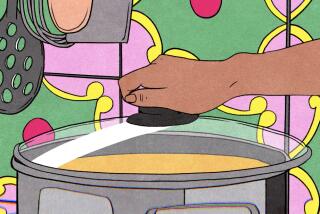Nicolas Guillen, 87; Known as Cuba’s ‘National Poet’
- Share via
Nicolas Guillen, the Cuban poet who melded the dialect and speech patterns of Cuban blacks with African folklore and rhythms into a movement called poesia negra (black poetry), making him one of Latin America’s best-known writers, died Sunday.
The official Mexican news agency Notimex, quoting the Cuban news agency Prensa Latina, said Monday he had died in Havana at age 87.
Guillen, who came to be known as Cuba’s “national poet” after the 1959 revolution led by Fidel Castro, had suffered from advanced arteriosclerosis and Parkinson’s disease. He had a leg amputated last month.
Guillen was the mulatto son of a journalist who was first attracted to poetry by a 1930 visit to Cuba by black American poet Langston Hughes.
Hughes’ leadership of the so-called Harlem Renaissance inspired Guillen’s first successful verse collection, “Motivos de Son” (“Motifs of Sound.”) The eight poems were structured like popular Cuban songs and dances interspersed with African elements.
He became the first to give voice to the squalor that was the black slums of Havana.
Guillen’s work came to celebrate Cuba’s multiracial and ethnic mix as well as the communist revolution that brought Castro to power. For more than 25 years he was director of Cuba’s Union of Writers and Artists.
“It is necessary to have a clear-cut attitude. My poetry is a dynamic process. . . . It constantly supports and encourages the struggles of peoples against inequality and imperialism,” he once said.
Prensa Latina said word of his death sent a shock wave through Cuba’s people, many of whom know his verses by heart.
Many of them--which exalt popular leaders while indicting foreign control--have been translated into scores of languages.
In the prologue to a book of what he called “mulatto” poetry, Guillen said: “In these verses perhaps enter the same elements that enter into the ethnic composition of Cuba, where we all are mestizos. . . . One day they will say: ‘Cuban color.’ These poems anticipate this day.”
The passage was quoted by Prensa Latina in the dispatch monitored in Mexico.
Guillen became a communist in 1937 and went to Spain to fight on the Loyalist side against the military uprising of Gen. Francisco Franco in the Spanish Civil War. He became well-known for his emotional readings of poetry to Loyalist troops.
After the Spanish republic was crushed by Franco in 1939, Guillen returned to Cuba as an active communist and outspoken writer on political and social grievances. He was arrested several times by the government of Cuban leader Fulgencio Batista in the 1950s.
From 1945 to 1948, Guillen had traveled in South America. Recollections of the trip were included in works published in Buenos Aires.
When Guillen tried to return from a trip to Chile in 1953, Batista refused to let him into the country and he began a five-year exile.
Castro’s triumph brought Guillen back to his homeland where he became the poet laureate of the revolution. His 1964 verse “Tengo” (“I Have”) praises the rebels, depicts Batista’s flight and celebrates the Cuban victory over the American forces in the Bay of Pigs invasion.
His “El Gran Zoo” (“The Great Zoo”) taunts imperialism while musing on love, nature and the mystery of life itself.
His “La Paloma de Vuelo Popular” (“The Dove of Popular Flight”) includes elegies and is considered a masterpiece of the Spanish poetic genre.
Guillen had been a member of the Communist Party’s Central Committee in Cuba but he had retired from political activity.
A prolific writer until his health failed, he was asked on his 70th birthday which of his poems he personally preferred.
“Those I still haven’t written,” he answered.
Prensa Latina said Guillen’s body would lie in state in the Plaza of the Revolution in Havana and that a public funeral will be held today.
More to Read
Sign up for Essential California
The most important California stories and recommendations in your inbox every morning.
You may occasionally receive promotional content from the Los Angeles Times.













